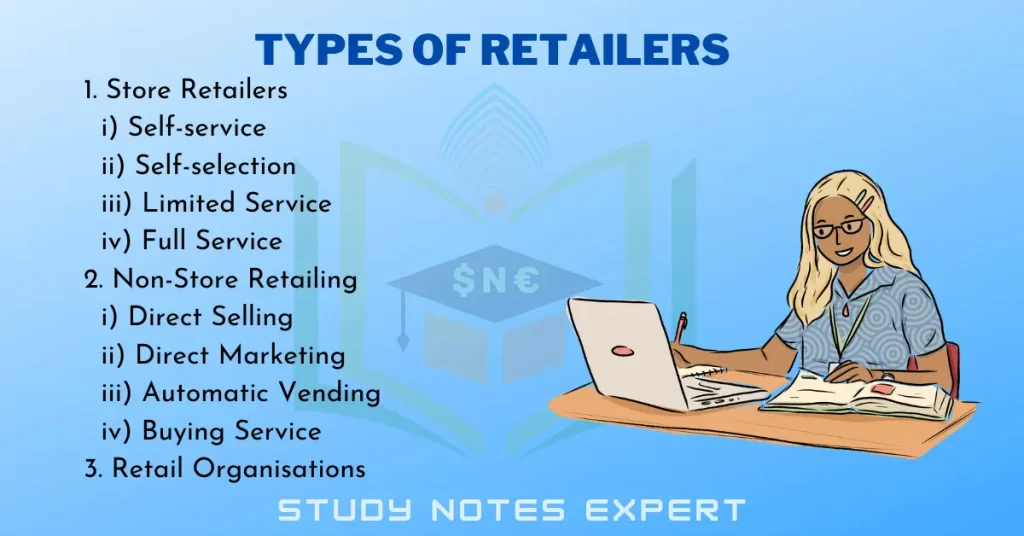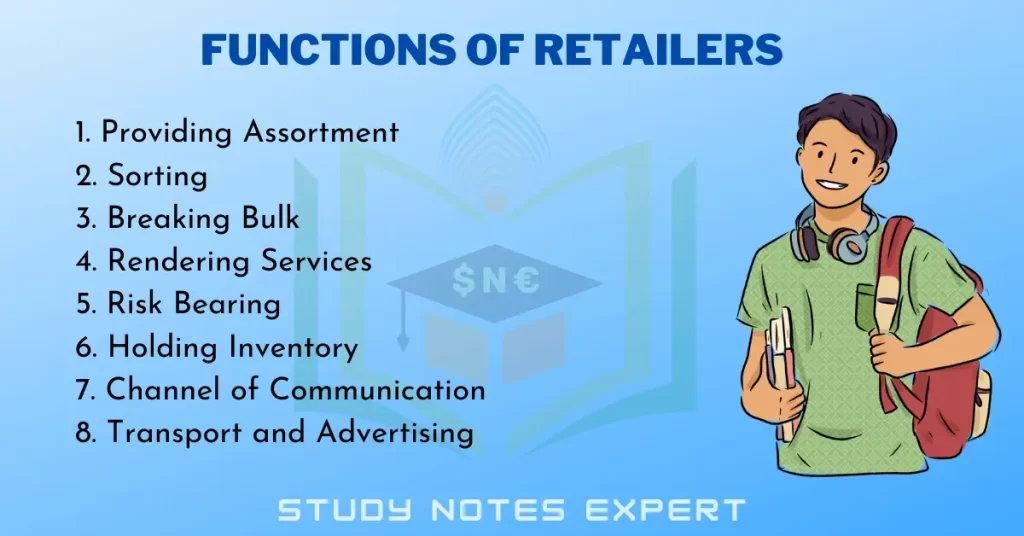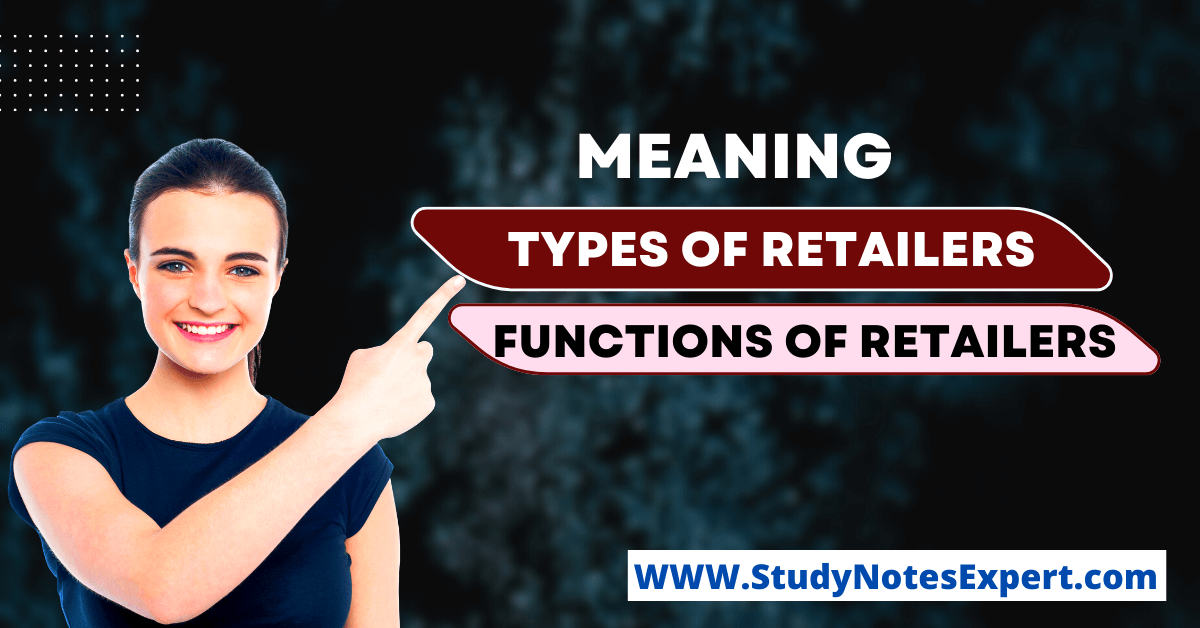A Retail store is any business enterprise whose sales volume comes mainly from retailing. Retail is the end or final stage of economic activity. Any organization sells to the final consumer, whether a manufacturer, wholesaler, or retailer. It doesn’t matter how goods and services are sold and where goods are sold. Therefore, we will discuss different types of retailers and main functions of retailers.
“Retailing Includes all the activities in selling goods or services directly to the final consumers for personal, non-business use.” –Philip Kotler.
Different Types of Retailers
Consumers today can shop for goods and services at various types of retailers that are store retailers, non-store retailers and retail organizations.

1. Store Retailers
The best-known types of retailers is the department store. Different forms of store retailers will have different competitive and price dynamics. Discount stores, for example, compete much more with each other than other formats. Retailers also meet widely different consumer preferences for service levels and specific services. There are different types of retail stores. These are the types of stores and functions of store management are as.
i) Self-service
Self-service is the cornerstone of all discount operations. Many customers are willing to try their “locate-compare-select” process to save money.
ii) Self-selection
Customers find their goods, although they can ask for assistance.
iii) Limited Service
These retailers carry more shopping goods & services such as credit & merchandise-return privileges. Customers need more information & assistance.
iv) Full Service
Salespeople are ready to assist in every phase of the “locate-compare-select” process. Customers who like to be waited on preferring this type of store.
2. Non-Store Retailing
Non-Store retailing is one of the types of retailers. It has been growing much faster than store retailing. Non-store retailing falls into four major categories—Direct Selling, Direct Marketing, Automatic Vending, and Buying services.
i) Direct Selling
It is also called multi-level selling & network marketing. It is a multibillion-dollar Industry, with hundreds of companies selling door-to-door or at-home sub-parties. A salesperson goes to the host’s home who has invited friends; the salesperson demonstrates the product & takes orders. The multi-level marketing sales system works by independent business people acting as distributors.
ii) Direct Marketing
It includes telemarketing, television direct response marketing and electronic shopping. As people become more accustomed to shopping on the Internet, they order more goods and services from a broader range of websites.
iii) Automatic Vending
It offers a variety of merchandise. It includes impulse goods such as drinks, coffee, candy, newspapers, and other products. Vending machines are found in factories, offices, large retail stores, and many other places.
iv) Buying Service
It is a storeless retailer serving specific clientele-usually employees of larger organisations. These are entitled to buy from a list of retailers that have agreed to give discounts in return for membership.
3. Retail Organisations
Although retail organisations are the types of retailers. Many retail stores are independently owned, and an increasing number are part of corporate retailing organisations. These organisations achieve economies of scale, greater purchasing power, broader brand recognition. Also, better-trained employees than independent stores can usually gain alone. The major corporate retailing types are corporate chain stores, voluntary chains, retailer and consumer cooperatives, franchises and merchandising conglomerates.
Also Read: Top 9 Functions and Types of Wholesale
Top 8 Functions of Retailers in Marketing

In General, there are different functions of retailers. Some of the functions of retail management are as follows.
1. Providing Assortment
This is one of the main functions of retailers. It is to provide variety to the consumers. Retailers have multiple brands, sizes, and colours. Their primary work is providing variety.
2. Sorting
Sorting means quality and grading. Grading is used basically in agricultural products. Retailers provide different brands & different qualities. Also, it is the main functions of retailers.
3. Breaking Bulk
Retailers purchase goods from wholesalers in less quantity. They provide goods in small quantities to consumers.
4. Rendering Services
Retailers have to provide many services to the customers. These are Credit services, information provided, Delivery server, after-sales services, etc.
5. Risk Bearing
Retailers bear the risk. It is one of the functions of the retailers, for Example- Transportation risk, warehousing risk, credit facility risk, etc.
6. Holding Inventory
Retailers must hold the inventory until the goods are sold. It is the functions of retailers.
7. Channel of Communication
Information provided to consumers, wholesalers, and manufacturers regarding goods.
8. Transport and Advertising
Free delivery service, In-store displays, banners, etc., are the functions of retailers.
Conclusion
Now, you will know the types of retailers who sell the things in single pieces. Retailers send goods to the final consumers. They perform various functions for sending these goods to the final consumers like transport, advertising, after sales service, hold inventory, etc.

